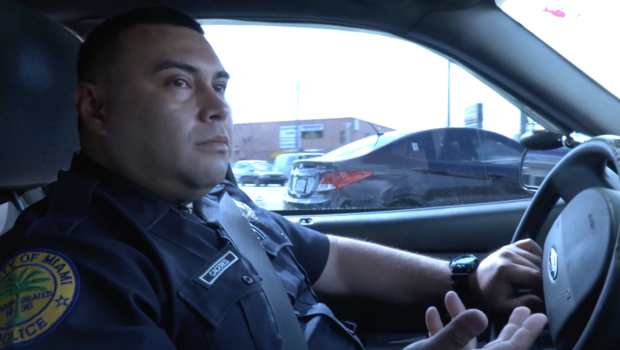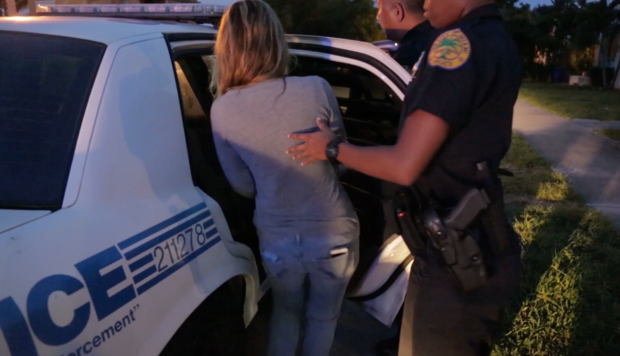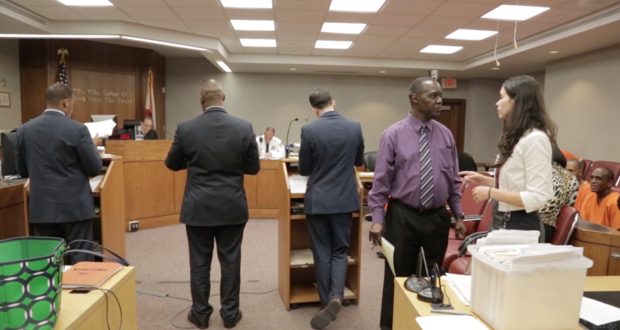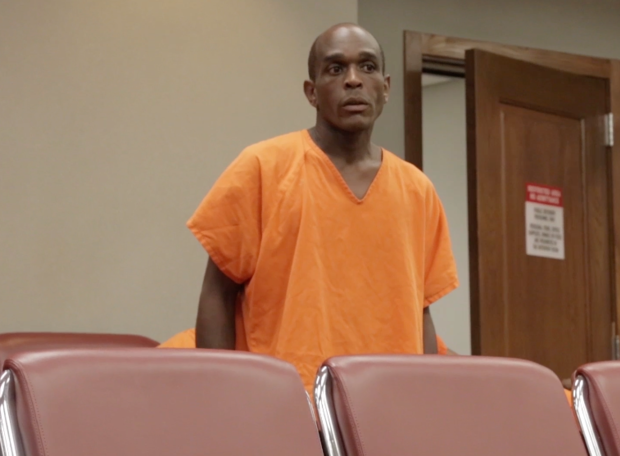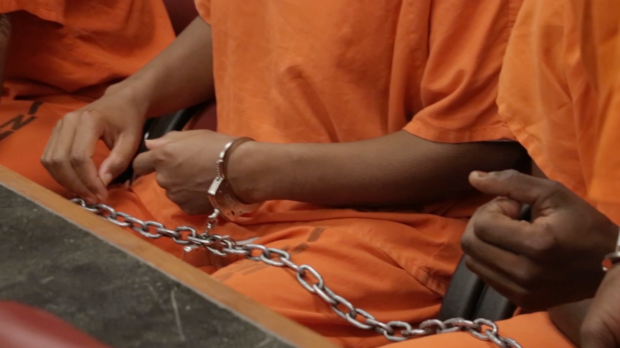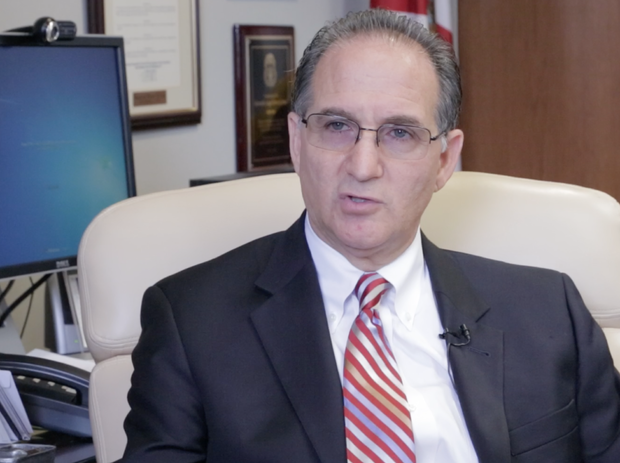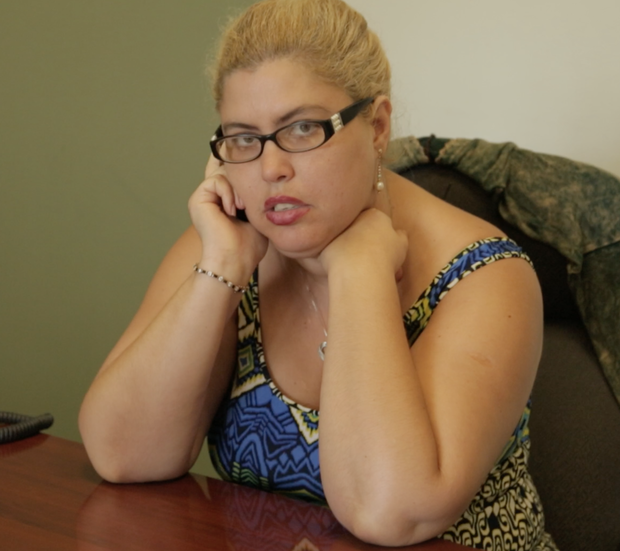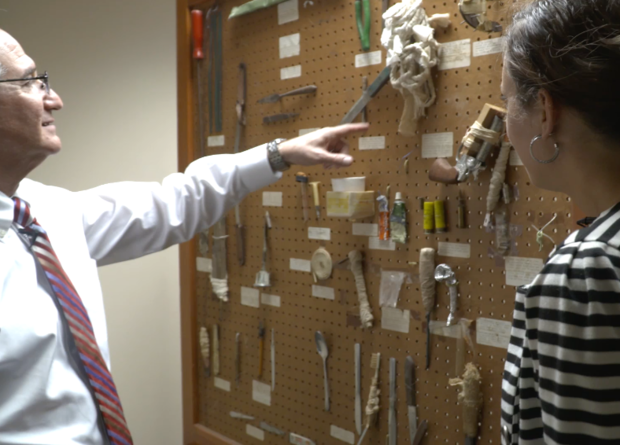Treatment or lockup? Criminal justice system grapples with mentally ill
On a hot and humid May afternoon in Miami's Little Havana neighborhood, Officer Marco Caceres was about to take a coffee break halfway through his 11-hour shift. Pulling up in front "Pastelmania" Cuban bakery, Caceres, who has been with the Miami Police Department for eight years, smiled in anticipation of "the best Cuban coffee in the city."
Caceres kept one ear on his police radio throughout the short break. He is one of the only officers in his department trained in a special kind of program called crisis intervention team policing, or CIT, so if a call comes in requiring his attention, he has to be ready to jump on it.
CIT programs are designed to improve the way law enforcement responds to people suffering from mental illness. CIT is a nonprofit membership organization founded in 1988 by Lt. Sam Cochran in Memphis, Tennessee. So far, around 3,000 law enforcement agencies across the country have sent at least one officer to participate in the 40-hour training course.
"Our instructor calls it judo talk - you talk to them like you've known them your whole life," said Caceres, glancing at the built-in laptop in his car, which flashed a description of each call streaming in. It wasn't long before he responded to a couple labeled CIT, including the last call of his shift, which involved a young woman whose father had called the police because he believed her mental illness was causing erratic, suicidal behavior. Caceres and a colleague handcuffed her and she was taken to a crisis intake medical facility.
"You're taking that extra step. Instead of just 'Grab him, handcuff him, put him into your car,' you actually tell him it's gonna be okay. You're there to help him out, take him somewhere where he could get medicine or see a doctor," said Caceres. "So yeah, we take a little extra step into the danger zone. They don't want us sometimes to even pull our taser out so yeah, there's a little more danger when you respond to one of these calls."
In Miami-Dade county, CIT is a key part of a criminal justice reform program called the Jail Diversion Program. It was set up 15 years ago to help tackle the problem of mental illness engulfing the community. Officials there estimate that almost 1 in 10 people in Miami-Dade suffer from serious mental illness.
"What you realize when you're doing all this, is that the system is so painfully and horribly fragmented that, even if you didn't have a mental illness, it's impossible to access services for so many people," said Miami Dade County Court Judge Steven Leifman, who presides over the Eleventh Judicial Circuit Criminal Mental Health Project, which champions the Jail Diversion Program. It's the largest court in Florida and the fourth largest trial court in America.
Leifman was taking a break following a morning court session in May, during which he presided over about a dozen cases exclusively from the mental health docket. The defendants had all worn orange jumpsuits, most were handcuffed, and some, according to the judge, showed "very clear" signs of hearing voices.
The people in handcuffs ranged slightly in age and gender, but they were mostly black men between the ages of 30 and 50. As Leifman called each case, he asked each person if they minded him asking a series of personal questions. No one did. Most answered his questions - about their mental health history, whether they were homeless, on medication, details of their criminal history - candidly.
He explained that what the jail diversion program really does is "connect the dots" for people to be able to access services that they need for recovery:
"It's just so damn hard for them to access it [services], that they end up only getting it when they get arrested, which is a horrible way to get treatment. So we try to put that all together and ... really tailor it to what [their] needs are," Leifman said.
"One guy came in, he had a crack addiction along with serious mental illness, so the first thing I'm going to have to do with him is try to get him detoxed on the crack so we can start to work on his mental illness."
Miami-Dade County jail - where the dozen-or-so mentally ill defendants appearing on the morning in question were transported from - now essentially serves as the largest psychiatric facility in the state. A similar phenomenon exists across the country: nationwide, there are 10 times more people with mental illness in jail or prison than in the hospital, according to a study published by the Treatment Advocacy Center.
"This particular program you saw today has reduced the recidivism rate for the misdemeanor mental health population from about 72 percent to 20 percent," said Leifman.
"What generally happens in most jurisdictions in the U.S., they don't do any of this," he said. "A person gets arrested, they'll try to deal with the charge, they resolve the case, the person walks out the door just as sick, or usually more sick than when they came in. And then they get re-arrested and they keep going on and on again."
Overall, the prison system costs American taxpayers at least $39 billion and every year about 2 million people with mental illness are incarcerated. At a given time at least 400,000 people with mental illness are behind bars. They account for roughly one-fifth of America's overall jail and prison population, yet it costs roughly twice as much to keep someone with mental illness behind bars, compared to other inmates or prisoners.
"I started the jail diversion program ... after I had a really difficult case," said Leifman, recounting how a middle-aged couple came into his chambers desperate to get help for their son, who they said was a Harvard-educated psychiatrist and former employee of Jackson Memorial Hospital in Florida.
"I didn't know anything about the system, and I made the mistake of promising I could help," Leifman said, shaking his head.
"He kept insisting there was nothing wrong with him in court, and he was in jail on a really silly charge - and it was something like a local county ordinance violation. So I asked him: 'I just don't understand one thing - why would a Harvard-educated doctor be homeless, and cycling through the criminal justice system?'"
The tone, he said, shifted drastically at that moment.
"All of a sudden he got a look on his face - almost like a wounded animal. ... It was how you'd imagine someone would look when they know they're about to die."
Leifman described how the man started screaming at the top of his lungs, hands over his ears - a sign that someone is hearing voices - and, repeating everything six times, shouted that he wanted his parents thrown out of the courtroom because they were CIA agents out to kill him.
"At the end of his rant all you could hear was his mother crying," said Leifman. "I'll tell you, you don't become a judge or a police officer, or anyone in this system, to become part of the problem. I was determined never, ever to be in that position again. It was just horrifying."
Although Leifman ordered three psychiatric evaluations, all of which found the man incompetent to stand trial and in need of immediate hospitalization, a Florida Supreme Court case had ruled that county court judges had no jurisdiction to involuntarily commit anyone so the only option was to release him out to the street, "floridly psychotic," as Leifman puts it. After that, he said he immediately set out making calls, consulting with experts on the mental health system.
"I firmly believe 80 percent of the solution rests with the community. I think 20 percent rests with the state and federal government. Part of the problem is how and what they finance - and in some ways they contribute to the problem because they finance things that are very expensive, and they don't finance the things that would keep people from ever getting here. They inadvertently push more people into the system."
As an example, Leifman pointed to the fact that Florida spends more than $210 million a year to ensure that seriously mentally ill defendants are competent to stand trial. According to a recent Florida Senate report, that's one-third of the state's entire adult mental health budget, spent on just 3,000 people.
State funding for basic mental health services in Florida ranks 49th in the nation per capita. The bulk of treatment and recovery costs fall on various nonprofits, who provide $506 million in mental health and substance abuse services to the state's uninsured population.
"In some ways it meets the definition of insanity: we keep doing the same thing again and expecting different outcomes," said Leifman. "So one of things we've done in Dade County, is we've come up with an alternative system ... that instead of just focusing on restoring them, we're focusing on reintegrating them into the community."
Across the country, state budgets cut over $4 billion in public mental health spending between 2009 and 2012. Just two percent of adults with serious mental illness receive comprehensive services - such as housing and employment support - available through programs like Leifman's, according to the National Alliance on Mental Illness.
Almaleidys Valdes is among this 2 percent.
The Cuban-born 36-year-old was arrested in March 2014 by two officers not trained in CIT. According to the police report, the officers found her "banging a broom on the railing of the third floor walkway" in her building in Hialeah, about 12 miles north of Miami, in Miami-Dade County. The report describes how she struck one officer in the face with a closed fist and then scratched the other officer.
"Before I was arrested, I wasn't in my mind. I don't remember, not even when I got arrested. I don't remember nothing," said Valdes.
A court-appointed social worker was able to get her into the Jail Diversion program shortly after her arrest. He now oversees her recovery, doing things like ensuring Valdes takes her medication, and coordinating tasks for her to do with the assisted employment training she's receiving in downtown Miami, at a facility called the Key Clubhouse.
"What I do I answer the phone calls, I open the door, I make sure people here sign the sheet," Valdes explained, as she sat at her desk in the Clubhouse entryway. She's been working there for five months.
"I love talking to people, I love seeing people, I like to deal with people," she smiled. Her spirits were high because she was set to make her final court appearance as part of the Jail Diversion Program.
"Tomorrow I finish, I feel happy," Valdes giggled. She said she plans to continue working at the Clubhouse, take her medication, and spend time with her family.
In May 2015, the Council of State Governments named Miami-Dade one of the four sites in the U.S. that should serve as a model for mental health and criminal justice reform- to make jails a last resort, rather than a first step, for the mentally ill who are on the brink of entering the corrections system.
Around the same time, the culmination of the work of the Jail Diversion program entered a new phase.
A short drive from both the Miami police headquarters and the Eleventh Judicial Circuit Criminal Mental Health Project, there is a imposing, gray building. Formerly a psychiatric facility for restoring competency among the criminally insane, the building's eerie, abandoned corridors still reveal fragments of the 1970s mental health landscape most people working in field today would rather forget, like prisoner's creative homemade shanks (among other weapons) and plastic defense shields once used by guards.
"It's very creepy. It's an old state hospital, so you get to see some really weird stuff in here," said Leifman as he walked through the facility's 18,000-square-foot grounds. He frequently gestured toward certain rooms, mapping the remodeling project that was about to start: "We're going to tear all this area down and make it a kind of open area."
"This building is going to be for the people who get arrested the most and who have acute mental illness," said Leifman, explaining how he's converting this into a forensic diversion facility.
"This will be the first of its kind in the country," said Leifman. "A facility that will have all the essential services that people need for recovery, in one place."
The services he listed include a crisis care unit, a courtroom, a short-term residential facility, a primary health care unit, and a supported employment and culinary program.
"We apply a criminal justice model to a public health problem and it doesn't work. It's a disaster," said Leifman. He hopes the rest of the nation looks to his court, to the Jail Diversion Program, and eventually to the forensic diversion facility to see that a new approach is possible.
"I learned that this is not just a local problem, but a state and national one. Our numbers are bigger (in Miami-Dade), but it's still a problem everywhere," said Leifman. "If I know that I could improve the public safety and save taxpayers money by doing it the right way, and I could help people get into recovery, I can't imagine not doing it, given the privilege of the job I have.
"I think it's part of all of our responsibility to do the right thing."
